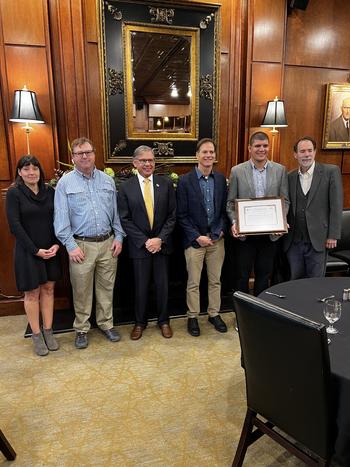
Michael Almeida’s groundbreaking work at the Biotechnology Research and Training Center at UNC Pembroke is further amplifying the university’s advances in Alzheimer’s research.
His doctoral study plan with UNC Wilmington evolved from earlier studies that led to UNCP being awarded its first patent in 2020 for a method to treat Alzheimer’s and traumatic brain injury patients. An international scientist and the lab manager of the William C. Friday Laboratory at UNCP, Dr. Almeida is credited with an important study to understand how shockwaves from explosives may lead to an increased risk of Alzheimer’s disease. A premier brain research journal published the study in 2021.
In December, Dr. Almeida completed his Ph.D. in comparative, integrative and marine biology at UNCW, becoming the first student to conduct an entire scientific project for a Ph.D. on UNCP’s campus. He conducted his research in the lab of Dr. Ben Bahr, William C. Friday Chair and Distinguished Professor and one of the world’s leading experts on neurodegenerative diseases.
As noted by Dr. Bahr, “Michael’s unique commitment to research and undergraduate mentoring allowed this collaboration between two UNC campuses to bring expert knowledge to UNCP students, from his interactions with UNCW physiologists, microscopists and chemists, and his training at the international Woods Hole Marine Biological Laboratory (MBL).”
“My Ph.D. research and training at UNC Pembroke helped me stand out in the scientific field,” Almeida said. “UNCP is well structured for research. Working in an internationally recognized lab with Dr. Bahr allowed me to train and connect with researchers and scientists from all over the United States, Europe and Latin America.”
Colleagues and faculty from UNCP and UNCW recently gathered on campus for a ceremonial luncheon to recognize his accomplishments.
His dissertation work was based on the growing evidence that natural extract-based product supplementation can help slow cognitive decline and prevent age-related dementia, including Alzheimer's disease. He compared the efficacy of these natural dietary products with the protective molecular pathways activated by physical exercise in the brain, which have been shown to prevent age-related cognitive dysfunction.
A native of Brazil, Almeida came to North Carolina with his wife and fellow scientist, Dr. Karen Farizatto, a former research assistant professor at UNCP who conducted postdoctoral research in Bahr’s lab.
During his time at UNCP, Almeida’s contributions have extended beyond the lab. Last summer, he organized the first-ever high-resolution microscopy and imaging system training for undergraduate researchers, recent graduates and faculty. The three-day program featured microscopy experts from New York University, UNC Wilmington, UNC-Chapel Hill and Vanderbilt University.
Through his research and training, Almeida has garnered national awards and invitations for postdoctoral training at internationally recognized institutions, including Yale, Harvard, Rockefeller, Duke, UNC Chapel Hill, the National Institute of Environmental Health Sciences and the Scripps Research Institute.
